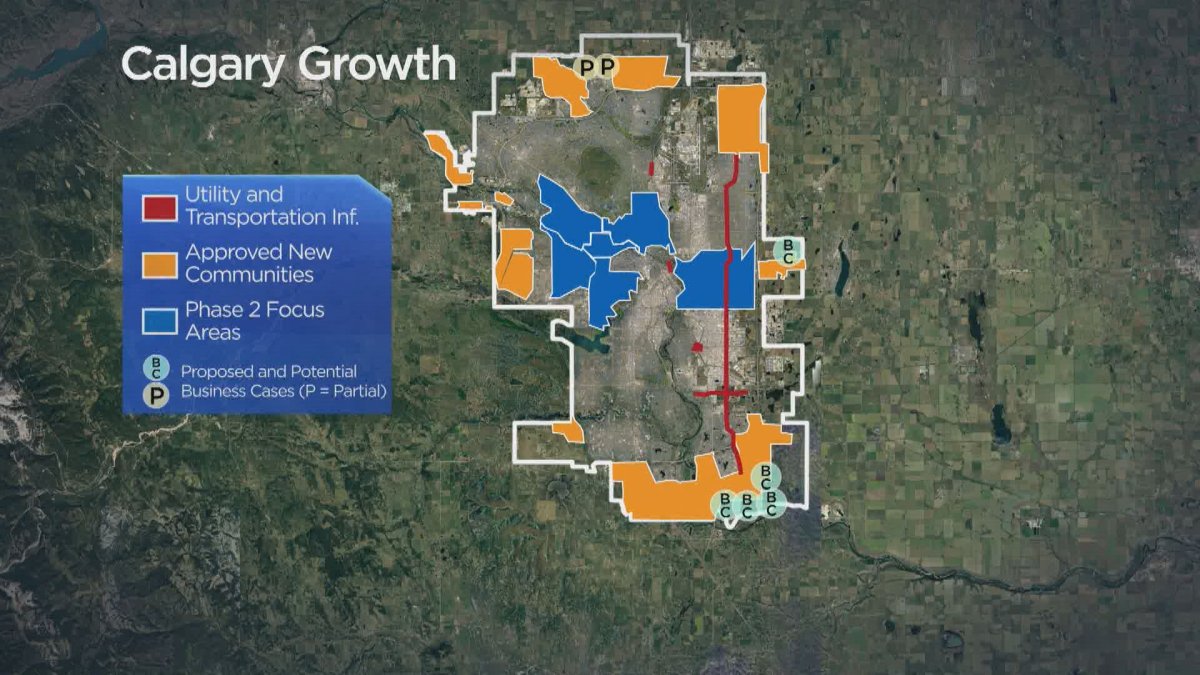A strategy to facilitate Calgary’s future growth, including eight proposed new communities, was front and centre at a city committee on Monday.

City developers spent much of the day presenting their business cases for 19 proposed new communities at the city’s Infrastructure and Planning Committee.
According to city administration, Calgary’s population is expected to grow by 22,000 people annually or an additional 88,000 people in total by 2026.
That growth translates into a need for approximately 44,000 single, semi-detached and multi-family homes, a city report said.
City administration recommended that committee members approve only five of the new proposed communities to help meet demand, with an additional three new communities that could possibly be supported if risks around “servicing, operating cost efficiency and absorption” can be mitigated.
According to the city’s growth strategy, those new communities, including 39 previously-approved new communities, are expected to require an investment of $532 million over the next four years for transit, roads, utilities, and emergency services.
The report also recommends an additional $232 million over four years for transit, roads, and utilities in 250 hectares of industrial areas in the city.
Another $83 million over four years is recommended for established areas in the city that is expected to cover capacity building projects and “improve the attractiveness of established areas.”
“If we continue to build the city into the decades ahead the way we built it over the past many decades, we’re going to be in a world of hurt,” Ward 9 Coun. and committee chair Gian-Carlo Carra said. “Financial hurt, social hurt, and climate and environmental hurt.”
Representatives from the development industry lobbied committee, saying that the proposed new neighbourhoods would help supply demand and keep Calgary homes competitively affordable.
Brian Hahn, the CEO of BILD Calgary, said affordability in Calgary’s metropolitan region is “amongst the best in Canada.”
“There can be no mistaking that there are pressures on that affordability,” Hahn said. “It will be important to maintain supply as we go forward and make sure we have a very available supply to maintain affordability.”
There were 85 members of the public registered to speak during Monday’s meeting, and several told committee the proposed strategy and new communities are in conflict with the city’s goal of reaching net-zero emissions by 2050.
According to city administration, approval of the recommended new communities would result in a one per cent increase of city-wide greenhouse gas emissions, and “the destruction of over 300 hectares of natural assets and the ecosystem services they provide.”
“This plan is economically flawed, ecologically catastrophic and morally indefensible in a climate constrained world,” Sustainable Calgary co-founder Noel Keough said.
Keough told committee the strategy would “produce urban sprawl in spades,” and should be reconsidered because it will add pressure for car dependence.
“Affordability? Not this plan,” he said. “A relatively low sticker price on the home is a fiction. These new communities will oblige every household to purchase, maintain and operate at least one, probably two and perhaps even three cars.”
Greg Miller, another public speaker, told committee he felt the proposal is like “Groundhog Day,” and should be rejected.
“It’s counter to the city’s stated goals, it’s counter to declaring a climate emergency,” Miller said. “Break the cycle, reject this proposal, and embrace our future.”
According to Carra, the “most environmentally sensible” the city could do is to stop allowing development on the outskirts of the city, but the city’s established neighbourhoods can’t accommodate the forecasted population growth.
Carra added that suppressing growth would push people outside the city’s tax-base and into surrounding communities like Airdrie, Cochrane, Okotoks and Chestermere.
“We’re working on that system, against stiff political headwinds,” Carra said. “Until we’re able to scale growth as redevelopment, we’re going to have to accommodate growth on the edge and we’re doing that smarter and better than we had before.”
Committee debate went late into Monday night, and councillors voted to come back on June 30 to continue the debate and vote.
City council will have a final say on the strategy and new proposed communities, but spending won’t be determined until budget deliberations in November.





Comments